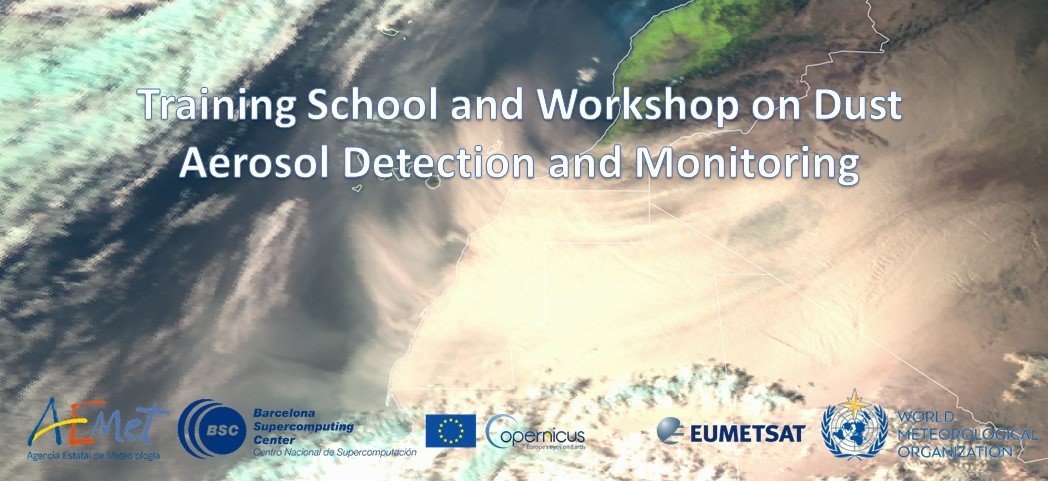General

The Training School and Workshop on Dust Aerosol Detection and Monitoring aims to provide an awareness of state-of-the-art satellite-based, ground-based, and model-based products for aerosol detection and monitoring. In addition, it will offer opportunities to learn more about the applicability and effectiveness of the respective products.
An additional full session of the school, jointly organized by EUMETSAT and the WMO SDS-WAS Regional Center (which is managed by the Barcelona Supercomputing Center, BSC, and the Spanish Meteorological State Agency, AEMET) with the support of Copernicus and ACTRIS programmes.
Target audience
- Actors in Meteorological and transnational Agencies, focusing on Europe, North Africa, Middle East, and Sahelian Africa.
- Researchers / academics from the above regions, with a focus on beginners.
Course outline
The course is structured on three elements:- Webinars and presentations (self-study in preparation of live sessions), targeting those willing to learn or refresh their knowledge on the basics of aerosol and dust, principles of observations, modelling and forecast; including retrievals and uncertainty
- Data discovery sessions with assignments, targeting those willing to be introduced to the access, content and manipulation of the key satellite, ground-based, and modelling products. No prerequisites on coding in python or data handling are needed. Basic knowledge of EO data would be an advantage.
- Interactive workshop, targeting those willing to progress on data discovery, develop practical case studies and exercises. During the practical training, you will learn basic principles in data handling, management and processing with Python on real-cases.
Phase I: Training School | 25 and 27 January (open to all)
>> Direct enrolment here (Zoom registration)
Agenda
We will be using slido for the Q&A sessions, use the code #Dust to join the discussion.
Recording LIVE session on 25 January:
Recording LIVE session on 27 January:
Course resources for self-study
Presentations and recordings of lectures in preparation of Day 1 - 25 January:
- General introduction to the training, Federico Fierli, EUMETSAT > download pdf
- Introduction to desert dust, Sara Basart, BSC > download pdf
- Observing aerosols, Federico Fierli, EUMETSAT > download pdf
Recording:
- Introduction to satellite data, Anu-Maija Sundström, FMI > download pdf
Recording:
Presentations and recordings of lectures in preparation of Day 2 - 27 January:
- Dust ground based observations, Lucia Mona, ACTRIS - CNR > download pdf
Recording:
- Modelling and forecasting Sand and Dust Storms - Model evaluation, Sara Basart, BSC > download pdf
Recording:
Phase II: Interactive workshop | 31 January - 2 February
Group 1: 09:00 - 11:00 CET
Group 2: 12:00 - 14:00 CET
Selected participants will receive information about the group assignation and how to join their practical session.
The workshop will be based on data discovery, practical case studies and exercises. During the practical training, you will learn basic principles in data handling, management and processing with Python.
- Collaborating, networking, interact with the experts.
- Extensive practical training with daily assignments.
- Perform analysis with multiple datasets on real case of dust event monitoring and forecast.
- Group work: participants needs and special projects (e.g. focus on a specific region, identify different type of aerosols, characterize an event, implement a workflow etc.)
- A basic knowledge in programming would be advantageous.
- A basic understanding in structure and formats of geospatial data / Earth Observation data.
